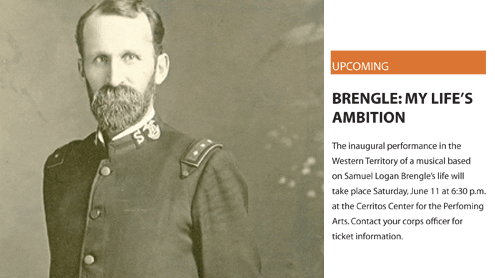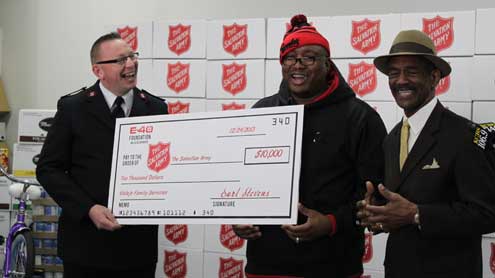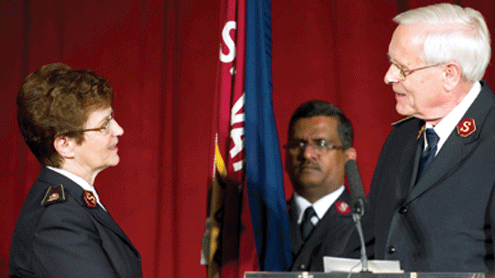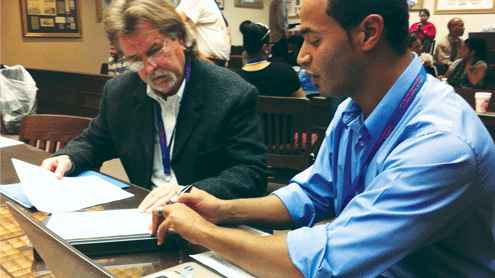By Sharon Robertson, Lt. Colonel
Samuel Logan Brengle’s lasting impact on The Salvation Army and the kingdom of God
 Years ago there was a movie based on the Audrey Erskine Lindrop novel, The Bandit and the Priest (aka The Singer Not the Song). The story focused on the reluctant but growing relationship of trust and appreciation between a priest and a young bandit who (as I remember it) in a desperate moment had been forced to accept the priest’s assistance. The priest patiently sought to bring the young man to an understanding and acceptance of the power and love of God; the young man persisted in his conviction that it was the personal qualities exhibited by the priest that made him so effective—the man, not his message; the singer, not the song.
Years ago there was a movie based on the Audrey Erskine Lindrop novel, The Bandit and the Priest (aka The Singer Not the Song). The story focused on the reluctant but growing relationship of trust and appreciation between a priest and a young bandit who (as I remember it) in a desperate moment had been forced to accept the priest’s assistance. The priest patiently sought to bring the young man to an understanding and acceptance of the power and love of God; the young man persisted in his conviction that it was the personal qualities exhibited by the priest that made him so effective—the man, not his message; the singer, not the song.
With Samuel Logan Brengle, there can be no doubt that it was the song, not the singer: one cannot look at Brengle’s life, read his writings or the testimonies of those who knew him without coming to the realization that to Sam Brengle, young or old, he, himself, was nothing special—the power of God was.
God, working through Brengle, touched the lives of millions; according to Salvation Army records, more than 100,000 souls were won to the Lord through his ministry. What an incredible harvest! Most of us are happy to think that we may have had the privilege of touching a few lives or winning even a few souls to the Lord.
Last year the Army commemorated the 125th anniversary of that day when young Brengle knelt and accepted the gift God had been waiting to give him—the gift of the Holy Spirit. In that moment of surrender, of total consecration of body, mind and spirit, God came, entering with cleansing, sanctifying power into his life. From that time on, Brengle was God’s man, and according to those who knew him, God made himself evident in his life.
Today’s Salvation Army has been richly blessed through the heritage left by Brengle. His writings have been printed and reprinted for our study. Translations in countless languages have appeared throughout the world—in these days of worldwide digital access, probably more than even The Salvation Army itself is fully aware. Brengle Institutes on holiness are a fixture in nearly every Salvation Army territory; territorial institutes, camps and seminars are spiritual happenings designed by God and our Army leaders to perpetuate the teaching of holiness, with but one purpose: to bring officers and soldiers alike to a point of personal confrontation with the challenge of God to “Be holy, as I am holy” (1 Peter 1:16 NIV).
Researching this article convinced me of one thing: Brengle would have been embarrassed and humiliated to think of the Army honoring him, or even thinking of him, except in relationship to his message of holiness before the Lord.
Humility is a difficult concept to understand and accept; when one speaks of God’s having humbled one’s self, it is easy to feel that the testimony is a witness to one’s personal satisfaction in being able to testify to his own humility, and is therefore a testimony to pride rather than true humility. It is hard to accept a claim of humility at face value.
 In spite of that fact, it is my belief that, great personage that he was, honored by countless Christians (and many non-Christians) throughout the world, Brengle was honest in his confession of humility, and with good reason to be so: Brengle was absolutely convinced that apart from Christ, he was a man of no great consequence. He knew he had certain personal attributes, and as a young man had hoped to do well as a lawyer; later, after his call to ministry, he had hopes of becoming a successful minister in a large church.
In spite of that fact, it is my belief that, great personage that he was, honored by countless Christians (and many non-Christians) throughout the world, Brengle was honest in his confession of humility, and with good reason to be so: Brengle was absolutely convinced that apart from Christ, he was a man of no great consequence. He knew he had certain personal attributes, and as a young man had hoped to do well as a lawyer; later, after his call to ministry, he had hopes of becoming a successful minister in a large church.
So he might have done, had things gone according to his own plans, but God had other ideas—and had Brengle failed to yield himself totally to God’s plan for his life, we might well have never heard of Samuel Logan Brengle, a gifted speaker of the late 19th and early 20th centuries. Certainly the Army world of today would not be honoring him as its most gifted proclaimer of the gospel of Christian holiness.
Which brings us to the crux of the matter: Brengle was not concerned about whether or not we respected or admired him; his greatest desire, the thing that would give him the greatest joy, would be to know that God continues to be glorified and lives continue to be changed as men, women and young people yield their own lives to cleansing and empowerment through the indwelling of God’s Holy Spirit. Brengle knew the truth: It’s the SONG that matters, not the singer.
And we agree, don’t we?
Singing the Lord’s song in a strange land
I am reminded of the pitiful cry of the Jews in Babylonian captivity, men and women who had hung up their harps, mourning, “How can we sing the Lord’s song in a strange land?”
We live in a strange land, a land where holiness seems a desirable but unattainable goal, as much a dream as was the despondent Jews’ unbearable, debilitating recollections of the devastated Jerusalem. In a social, political and economic climate where the media and the worldwide web do their best to convince us that fulfillment can best be found in power, self-centeredness, humanism and indulgence, the possibility of personal holiness (or holiness of any kind) seems unthinkable, impossible.
Until we remember: “Nothing is impossible with God” (Luke 1:37 NLT). The God who gave a child to a barren woman, the God who caused a virgin to bring forth his own son, is the same God who commanded, “Be holy, because I am holy,” the same God who caused the author of the Book of Hebrews to write, Make every effort to live in peace with all men and to be holy; without holiness no one will see the Lord (Heb. 12:14-15 NIV).
A few facts for review (as I see them; I hope you agree!):
According to the Scriptures, holiness is not only possible; it is God’s will for his people.
You and I want to be obedient to God’s will in all things.
God and we want to see God’s Army marching in the strength and power of the Lord,
and in the beauty of his holiness.
Something appears to be missing—we are not seeing the power of God’s Spirit working at full potential.
With total commitment to God, and the sanctifying presence and empowerment of the Holy Spirit in the lives of each and every officer and soldier in The Salvation Army, we, as individuals and as an Army would see victories beyond our greatest imaginings.
Brengle believed that. Through Brengle’s life and ministry God gave us an example of how it could work in today’s world. (Think about it—one man, one God—over 100,000 souls saved and innumerable men, women and children blessed!)
What we need is a battle plan—not a group of administrators of high rank telling us how to go on, but a solid, field-ready battle plan, where you and I DETERMINE to accept the commander-in chief’s challenge (that’s God, not the General, no matter how much we appreciate her) to be filled with his Spirit, and live in holiness and total submission to his will.
Let’s (you and me) declare this the YEAR OF HOLINESS UNTO THE LORD. We must not be—we must refuse to be—satisfied until that has become, not just a battle cry, but also a reality. It starts here and now, with God’s people on their knees:
If my people, who are called by my name, will humble themselves and pray and seek my face and turn from their wicked ways, then will I hear from heaven and will forgive their sin and will heal their land (2 Chron. 7:14).
And it continues to here:
And I heard a loud voice in heaven, saying, “Now the salvation and the power and the kingdom of our God and the authority of his Christ have come, for the accuser of our brethren has been thrown down, who accuses them day and night before our God. And they have conquered him by the blood of the Lamb and by the word of their testimony, for they loved not their lives even unto death” (Rev. 12:10-11 RSV).
That can only happen through the power of the Holy Spirit. Believe it! Receive it! Live it! Sing it out loud!
Do it, and the world will know it, because the power is in the song—the living expression of the Holy Spirit—not the singer. Do it, and to God will be the glory. (Brengle would have liked it, too.)
 Samuel Logan Brengle (1860-1936)— soldier and servant
Samuel Logan Brengle (1860-1936)— soldier and servant
For Samuel Logan Brengle, the only religion worth having was a “red hot religion” ignited by the unquenchable fire of the Holy Spirit.
Brengle was born June 1, 1860, in Fredericksburg, Ind., to William and Rebecca Brengle. When he was 2, his father left to fight for the North in the American Civil War, eventually dying from wounds sustained during battle.
His mother remarried, and despite many moves in the Midwest, church attendance was always a priority. At 13, Brengle received Christ as his savior during a series of revival meetings. He became a Bible class leader at 15, and later assistant superintendent of the Sunday school.
An excellent scholar, Brengle attended DePauw University in Greencastle, Ind. After graduating, he briefly served as a circuit preacher of the Methodist Church before enrolling at Boston Theological Seminary.
Salvation Army Founder William Booth visited Boston in 1886. His vision and passion for saving the world inspired Brengle. Soon thereafter Brengle met and married Elizabeth Swift, a Salvationist. Elizabeth died in 1915, leaving Brengle single for the remaining 20 years of his life.
Abandoning the seminary, Brengle traveled to London to pursue officership in The Salvation Army. He joined the Army in 1897 and served for 30 years, becoming the first American born officer to reach the rank of commissioner in 1926. After retiring in 1931, he continued to preach and teach for a couple of years, until his health began to fail. In 1935, General Evangeline Booth inducted him into the Order of the Founder. Brengle was promoted to Glory on May 19, 1936.
In 1947, the first National Brengle Holiness Institute took place near Chicago, drawing Salvationists from around the United States. The gathering became an annual tradition and continues today. In fact, annual Brengle Holiness Institutes are held in many countries around the world.
Brengle wrote, “Holy fire kindles in every soul that lives with him,” believing that as we seek God’s fire we become “burning and shining lights” in a cold and dark world.
He saw The Salvation Army corps as a place where men and women, compelled by the Spirit, could gather to pray for the lost without concern for comfort or convenience, no matter the time of day or night. To Brengle, the corps was a sacred place from which the love and power of God could be communicated to all—entire cities might be energized and “lit up” by the prayer of soldiers who had “caught the flame.”
Once asked for his secret of holiness, he replied: “Keep in the will of God, obey him, seek him daily, waiting at his gates. Read the Bible regularly. Never neglect secret prayer. Keep testifying to the grace bestowed upon you. Help others.”
Books by Samuel Logan Brengle: Love-Slaves, The Soul Winner’s Secret, The Way of Holiness, Heart Talks on Holiness, Helps to Holiness, Ancient Prophets, The Guest of the Soul, Resurrection Life and Power, When the Holy Ghost is Come
—Karen Gleason















